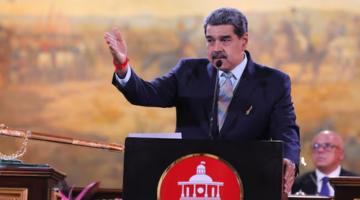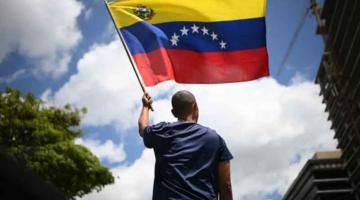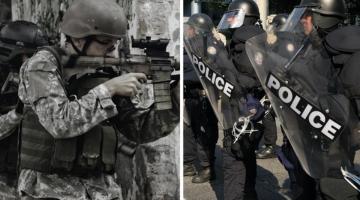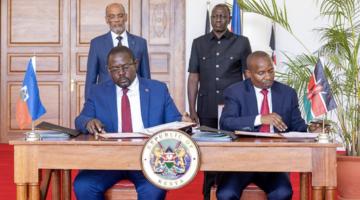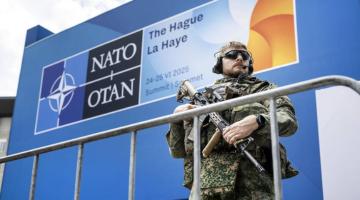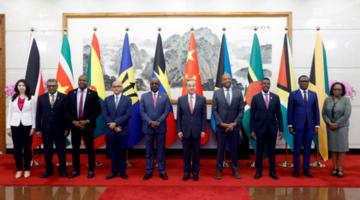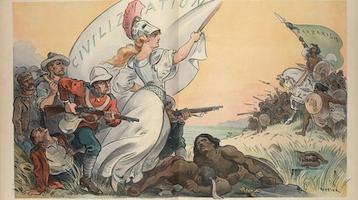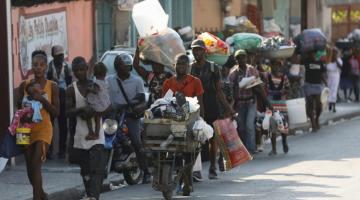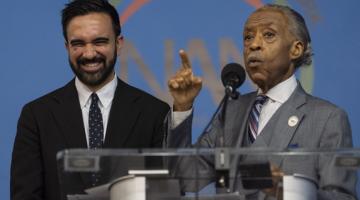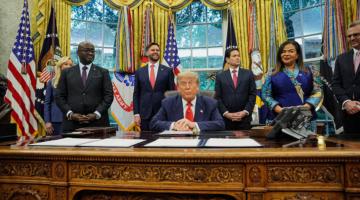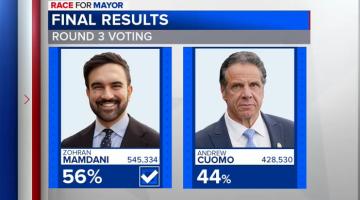An explosion left people injured and others dead and destroyed several houses and vehicles in Guayaquil, Ecuador, 2022. Ecuador National Police/Handout via REUTERS
Ecuador was once a safe country. However, U.S. interference, the rise of neoliberal economic policies, the dollarization of its currency, and enhanced state repression have combined to worsen the lives of the people.
Once on track to be the safest country in Latin America, now Ecuador finds itself mired deep in gang violence, robberies, assassinations and insecurity. Under the last three neoliberal governments of Lenin Moreno, Guillermo Lasso, and current president Daniel Noboa, there has been a surge in violent crime that has derailed any of the gains made during the leftist Correa government. On January 3rd, Black Agenda Report contributor Clau O’Brien Moscoso spoke to economic analyst Juan Fernando Terán to discuss how the surge in violence in Ecuador has political, economic and geostrategic dimensions, with implications for the whole region. This is part 1 of the conversation.
Clau O’Brien Moscoso: Starting specifically with the case of the Guayaquil Four, I wanted to ask, what context can you provide regarding the war on drugs, crime, and the violence happening that has led to tragic cases like this? How does Ecuador go from a success story in the Global South to a 500% increase in homicides?
Juan Fernando Terán: Well, look, I think what is happening in Ecuador needs to be understood within a much broader historical context; otherwise, it’s impossible to truly grasp what is going on. The first thing to point out is that Ecuador has been dollarized since the year 2000, and what initially seemed like a simple economic policy decision, in the long run, has facilitated illegal money laundering in Ecuador.
This marked an impressive internationalization of Ecuador starting in 2000, primarily through financial means, which was not initially evident in other forms. A second long-term factor to consider, which some Ecuadorians foresaw at the time (unlike the first point that caught nearly everyone by surprise), is the implication of this capital transnationalization for money laundering.
What was recognized over 20 years ago, however, is that anything happening in Colombia—where a war has persisted for over 60 years—would inevitably impact Ecuador. That much was clear. In fact, if peace were to be achieved in Colombia, the entire problem of drug trafficking would shift to Ecuador. This outcome was anticipated and predicted.
Therefore, it’s not surprising that from 2000 onwards, the discourse around controlling drug trafficking began to grow stronger. In reality, however, this was more about controlling the Ecuadorian population and serving as a pretext for the United States to establish military bases here.
So, it’s essentially a mechanism for controlling the population. When the U.S. military base was stationed in Manta (a port city in the Manabí province) during the first decade of this century, there was no effective control over drug trafficking. What’s happening now seems to be an attempt to repeat that scenario, but it has little to do with controlling drug trafficking. As Mexican President Claudia Sheinbaum has said: “Why don’t they control drug trafficking in the United States? Are there no mafias in the U.S.? Is money not laundered there? Does the drug trade operate independently in the U.S.? Why don’t they control it there?”
So, this isn’t just about drug control—it’s about population control. The situation involves, first, the transnationalization of illicit capital into Ecuador; second, a U.S. military presence as a preventive measure against the end of Colombia’s conflict (something that was foreseen); and third, the blatant interference of the U.S. embassy in Ecuador at this moment. This isn’t mere speculation.
The United States has always been involved in Ecuadorian politics. For example, one only needs to recall the book written in the 1970s by Philip Agee, where he described how, as a CIA agent, he conducted political operations in Ecuador. They've always been here. However, during Rafael Correa’s government, that interference was significantly nullified. They couldn’t exert influence on the government that existed.
But the period when U.S. influence was somewhat isolated from controlling Ecuadorian politics has now ended, and they’ve returned with force since 2017. Why? What evidence can we point to? The first evident thing is the well-coordinated management of political processes. Unfortunately, I say this because it’s true. Local oligarchies haven’t always had the capability or skill to manage political processes effectively, but this time, such capability is clear.
It’s evident that this isn’t simply the result of internal advisors to the current government, led by President Daniel Noboa. What we’re seeing is high-level guidance that cannot be expected from Ecuadorian technicians or politicians.
This is reflected in the case of the missing young boys. Let’s look at concrete examples. In early December, I don’t recall the exact date, the government announced a measure that seemed exaggerated and untimely. It declared an extended holiday, known here as a "feriado," spanning from December 30 to January 5, announced weeks in advance.
When I heard this announcement, it seemed suspicious—almost like they were planning something. By now, this government has proven not to act innocently. At that time, the case of the four young boys from Guayaquil hadn’t surfaced yet. However, if you review the dates, it likely coincides with when they already had information about the situation. The young boys disappeared on December 8, and they were likely murdered that same day or the next.
So, when I heard about the extended holiday, my first thought was: What are they planning? What’s going to happen? Then, on December 24, the charred bodies were discovered—a day when the public’s attention was focused elsewhere. Finally, it was confirmed that the bodies belonged to the four young boys on December 31, another day when the public was preoccupied. You can see how meticulously the timeline was managed to release information about this case. It’s a strategy clearly designed to distract the public and control the narrative.
Obviously, there have been missteps in leadership, but these do not negate the fact that this situation has been carefully orchestrated. It cannot simply be attributed to Ecuador's standard intelligence agencies. Social media has become a scourge for Latin America and our peoples, particularly during incidents like this. Instead of addressing pressing issues, the president posts trivialities on social media, diverting Ecuadorians' attention to irrelevant discussions.
For example, when the charred bodies were discovered on December 24, (President Noboa) went viral on social media, sparking a nationwide debate about his indifference and trivial behavior. Then, on December 31, as the confirmation of the bodies was made public, he used social media to showcase his tattoos, shifting public discourse to focus on them. This manipulative handling of social information is deliberate and politically motivated.
I reiterate, this cannot be understood without high-level guidance from the U.S. State Department, the CIA, or U.S. security agencies. It’s unlikely that local intelligence alone could plan and execute such a calculated strategy. To put it simply, they are not that smart.
Now, what are the likely next steps? Based on hints—albeit clumsy ones—it wouldn't be surprising if they attempt to blame the 16 military personnel they’ve already implicated. It was surprising to see them acknowledge the involvement of 16 soldiers, but this likely sets the stage for linking these individuals to drug trafficking. The narrative will likely shift to framing these soldiers as responsible, tying them to narcotrafficking while ignoring the broader context: this is part of state policies that have institutionalized states of emergency and permanent security measures.
Today, yet another state of emergency was decreed, covering several provinces. I’ve lost count of how many there have been—25, 26, 27? In the last seven years, these emergency decrees have achieved absolutely nothing. By definition, they are no longer exceptional; they’ve become the norm. These decrees, however, grant the military and police impunity for their actions and operations. If you review the decrees, they explicitly guarantee this.
This isn’t even a replication of Bukele’s model. Bukele’s model in Central America aimed, albeit with massive human rights violations, to control drug cartels and local gangs. In Ecuador, however, the objective is artificial—it was manufactured to control the country during a time when Ecuador holds geopolitical importance for the United States.
The situation in Ecuador is not comparable to that of El Salvador. In Ecuador, the goal has not been to tackle drug trafficking but rather to reestablish U.S. dominance over the region and Ecuador’s political processes.
Before concluding, let me point out something to emphasize the role of the U.S. Embassy. During the previous government, the U.S. ambassador openly stated that there are "narco-generals" in Ecuador. This was not a casual remark—it reflects a broader strategy of interference and influence.
If the U.S. ambassador knew the names of the narco-generals, why didn’t he share those names with the public or the government at the time? This raises questions about deliberate inaction, assuming it was mere omission. Another point to consider: if the goal is to control drug trafficking, why not focus on the ports where these drugs are being exported, particularly private banana-exporting ports? It’s straightforward—there’s no need to deploy soldiers on the streets; they should be monitoring these private ports, which operate outside public oversight. Why isn’t this being done?
It turns out the president and his family are involved in the banana export business, to put it delicately. Where are these bananas going? In Europe, shipments of bananas have often been found with large quantities of cocaine, making it the largest seizures of this type in global drug trafficking history. These shipments must bear seals, sender information, and company identifiers, right? Which companies are responsible? This information is unknown within the country. Instead of investigating at the top, the focus has been to criminalize the poor from the bottom.
Drug money doesn’t walk out of the country on its own. It moves through banks. Why not investigate which banks are laundering this money? It’s very simple. There’s no need to deploy the military to patrol the streets. But that’s not what’s happening right now. The spectacle of the “war on drugs” is played out in the streets against Black people, poor people, and indigenous people. This distracts from the real economic flows of narcotrafficking, which involve private companies, private banks, state institutions, and political candidates.
That’s what’s happening in Ecuador right now.
CO: Now, you were talking about the role of the United States and its embassy, correct? I’m currently in Lima, Peru, and I’ve been here reporting on the coup since it started. We’ve seen how the U.S. is not only operating along the Pacific Coast but also expanding into the Amazon and the mining corridor, setting up Southern Command bases. In Ecuador, they were recently given access to the Galápagos Islands.
From our perspective, this is all part of the U.S.’s broader interference. We see the coup here in Peru, the coup in Bolivia in 2019, and even the crisis within the MAS, which many suggest is influenced in part by the U.S. So, what do you think the next few months or even years will look like? Elections are coming up, and so is the potential for re-elections. What do you think the people, particularly those you mentioned like Afro-Ecuadorians, need to do? Right now, many of these organizations are mobilizing in the streets and organizing efforts.
What do you see happening, and how can people respond to what’s taking place? Because here as well, we notice the violence—hitmen, murders—all working in favor of the state and Congress. And we know they are influenced by the U.S. Embassy here. So, what do you see? Because this isn’t just about one country; it’s about the entire region. We can see they’re waging a war. So, how can this be confronted?
JFT: Well, I think the first thing to understand is that with Donald Trump’s presidency, we are facing the reality that Latin America will become the primary focus of the U.S. administration that follows. I work in international relations and continuously monitor global developments. I’ve come to a conclusion—one that isn’t far-fetched and is relatively easy to understand:
The Democrats are global business people. They have connections with major U.S. arms companies and have always maintained a global vision. Donald Trump, on the other hand, is a small-time hustler. He and his family made their fortune within the U.S. He understands shady dealings at the local level but lacks the Democrats’ global connections.
So, while Trump will have to engage with conflicts in Israel and Ukraine, he isn’t genuinely interested in those. His focus is on his backyard, and that backyard is Latin America.
While the world might see some relief in the conflicts in Israel and Ukraine, relatively speaking, the U.S. will deprioritize those regions—because for Trump, they aren’t lucrative ventures. The real issue will shift toward Latin America.
This is where he wanted, as he stated during his previous administration, cheap oil from Venezuela. He said he was close to taking Venezuela’s oil. He’s also pressuring Panama—something that wouldn’t have happened under the Democrats. He wants control of Greenland’s trade route. Why? Because that route, with the ongoing melting of ice and global warming, will become a key alternative for Russia’s trade by 2040 at the latest.
By blocking China via the Panama Canal and Russia via control of Greenland, it’s a continental strategy. So, Trump does not mean peace for Latin America—far from it. The region faces even greater challenges.
This may be good for Europe or the Middle East, but it’s not good for us. In Ecuador’s case, I don’t see the situation improving. I fear the worst.
I prefer to work from pessimistic scenarios—if they don’t come to pass, that’s better. But I refuse to work with naïve optimism, which politically misleads everyone and makes us believe the circumstances are different from reality.
Given the current level of institutional collapse in Ecuador, unimaginable things are already happening.
At this moment, for instance, they are disregarding a constitutionally elected vice president because they do not want her to take office during the period when President Noboa is supposed to conduct his political campaign. They are willing to do anything. They have no qualms about their actions.
In this context, I fear the worst. And what does fearing the worst mean? A fraud. They have all the institutional conditions to organize a fraud. Let’s start with the basics: in this scenario, it benefits the Armed Forces to keep someone like Noboa in power to cover their backs.
They are the ones transporting materials, electoral supplies, and overseeing the ballot boxes across the country. They will be mobilized and present throughout this electoral process. The Electoral Council is under their control, evidenced by declarations too lengthy to recount here but which clearly show their grip. So, I don’t expect these elections to be clean or transparent.
On the contrary, let’s recall the previous elections where a candidate was murdered to blame the leftist movements and ensure that Luisa González’s candidacy would lose. This is why I say there’s high-level advising behind these actions—because such things don’t just happen on their own.
I expect something similar now—perhaps another tragedy before or during the elections, or some very underhanded maneuver to prevent González from winning. Regardless, I believe the population is well-domesticated. I regret saying it, but that’s the reality.
When you observe that young people have shifted significantly to the right, when workers are leaning to the right, and when indigenous groups supported this government and everything that the recent right-wing governments have represented, it’s hard to expect a promising future.
Surveys published today, as of December 30th, raise questions. Were they done correctly? Were they not? Did they account for the phenomenon surrounding the Guayaquil children? The projections are astonishing.
It’s unbelievable to see how, despite the economic chaos, unemployment, loss of production, the three months without electricity, and the murder of the four young people, this man maintains approval ratings above 45%. Even if we assume the surveys were poorly conducted, that’s still a significant figure.
When you see paradoxes in those surveys, such as women not overwhelmingly supporting Luisa González—the first potential constitutionally elected female president of Ecuador—or young people, who once were a strong oppositional force, no longer being one, what can we expect?
I am not optimistic about what lies ahead. Whether by fair means or foul, this man will extend his stay in power, which will likely bring immediate political instability and harsher, more authoritarian measures, as they won’t be able to control part of the population. It’s not just a matter of them stepping down from power.
I believe the case of the four young men from Guayaquil compels them to try to stay in power because it involves a forced disappearance—a crime that does not expire.
Before this case, I thought that they would privatize all the mining concessions, as they’re indeed doing, plunder the country as quickly as possible, and not care about staying for another four years because they’ve already had their way in economic policy.
Right now, they are attempting to hand over Ecuador’s best oil field, the Sacha Field in the eastern region, to private hands. It’s not just about satisfying greed anymore. At this point, it has become a political and personal problem for them.
Staying in power is in their interest. We’re entering that typical authoritarian logic where, even knowing the people don’t want you, won’t want you, or no longer support you, you feel compelled to stay because you have no other choice. That, I think, is the scenario we’re facing.
And as I said, what surprised me the most was the political behavior of young people and women—it’s astonishing. If this country votes for the right again, forgive me, but it will deserve what it gets.
CO: Speaking of this rightward shift, do you see the role of NGOs funded by USAID, the National Endowment for Democracy (NED), or similar organizations as part of this strategy we’re seeing—not just from the government but also from the right, the media, and increasingly these NGOs, which supports this rightward discourse?
JFT: At one point, this was indeed the case with environmental advocacy. Yes, they operated in that sense. But now, they don’t even need to operate in that way. There is such tight control over information, such mastery of social media, slander, lies, and fake news.
The control over the population through social networks is so comprehensive that actors like them are no longer even necessary. At this point, I couldn’t tell you that there is a non-governmental organization leading the opposition, as could be the case in Nicaragua or in attempts in Venezuela—obviously NGOs funded by the United States.
I think Ecuador has been a prime example of the total success of the CIA and State Department.
Clau O'Brien Moscoso is an organizer and co-coordinator of the Black Alliance for Peace Haiti/Americas Team. Originally from Barrios Altos, Lima, she grew up in Kearny, New Jersey. She attended college, lived, and organized in New York City for 15 years, and is now based in Lima, Perú, writing about Latin America and the Caribbean for the Black Agenda Report.

